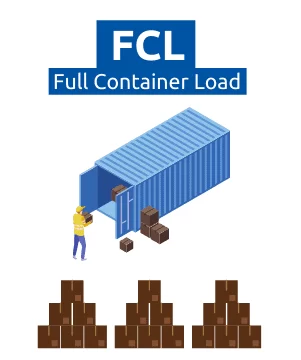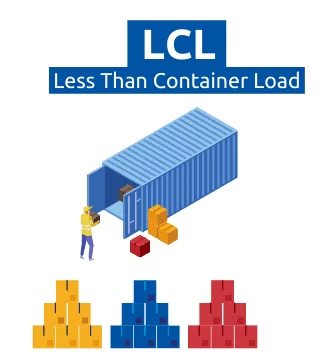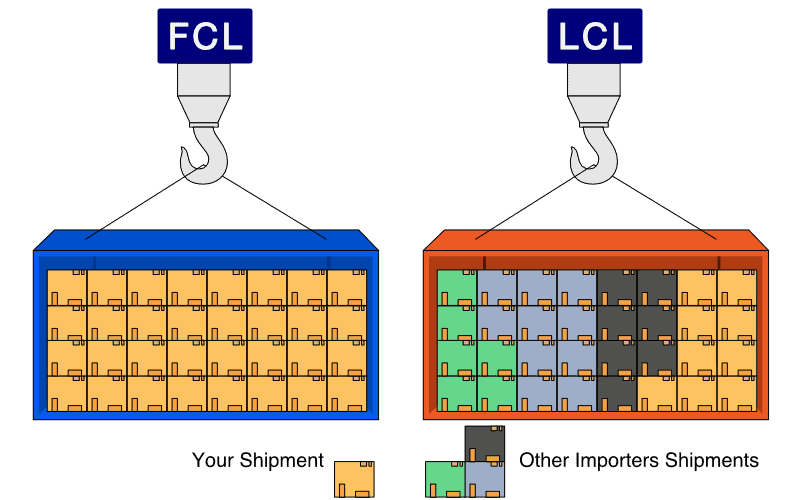
FCL Vs. LCL
Understanding FCL and LCL: Choosing the Right Shipping Solution for Your Cargo
In the realm of international shipping, the choice between Full Container Load (FCL) and Less than Container Load (LCL) can significantly impact the efficiency and cost-effectiveness of transporting goods. These two shipping methods cater to different cargo volumes and requirements, allowing businesses to tailor their logistics strategies to suit their specific needs. In this article, we delve into the nuances of FCL and LCL shipping, helping you make informed decisions that optimize your supply chain operations.
A freight forwarder in Iran can provide expert guidance on whether FCL or LCL shipping is best suited for your cargo needs.
Full Container Load (FCL) Shipping
FCL, or Full Container Load, refers to a shipping method where an entire shipping container is exclusively dedicated to a single shipment. Businesses that have a substantial volume of goods to transport often opt for FCL due to its benefits:
1. Exclusivity: With FCL, the entire container is dedicated to your cargo. This minimizes the risk of damage and contamination that can occur when sharing space with other shipments.
2. Faster Transit Times: FCL shipments are often expedited through customs and handled more efficiently since there is no need to sort or separate cargo from multiple shippers.
3. Reduced Handling: FCL shipments are loaded at the shipper’s location and unloaded at the consignee’s destination. This reduces the number of times the cargo needs to be handled, minimizing the potential for damage.
4. Suitable for Bulk Cargo: FCL is ideal for businesses that have a large volume of goods to transport, ensuring that the container’s capacity is maximized.

Less than Container Load (LCL) Shipping
LCL, or Less than Container Load, involves consolidating multiple shipments from different shippers into a single container. LCL is beneficial for businesses that have smaller volumes of cargo, offering several advantages:
1. Cost-Efficiency: LCL allows shippers to share the cost of a container, making it more cost-effective for smaller shipments that do not require an entire container.
2. Flexibility: LCL is suitable for businesses with variable shipping volumes. It offers the flexibility to transport smaller quantities without the need to wait for a full container.
3. Access to Global Markets: LCL makes it feasible for businesses to access global markets even with smaller shipment volumes, enabling expansion opportunities.
4. Reduced Inventory Costs: LCL allows businesses to maintain lower inventory levels while still having the ability to ship smaller quantities more frequently.

Choosing the Right Method
Selecting between FCL and LCL depends on factors such as cargo volume, budget, transit time, and the nature of the goods. Here’s a guideline to help you choose the most appropriate method for your needs:
Choose FCL when you have a sufficient volume of goods to fill an entire container, value expedited transit times, and want to minimize handling and potential damage.
Choose LCL when you have smaller shipment volumes, want to reduce shipping costs by sharing container space, or require flexibility in shipment frequency.

Partnering with experienced freight forwarders can be instrumental in making the right choice between FCL and LCL. These experts have a deep understanding of international shipping dynamics and can help you navigate the complexities of both methods to optimize your logistics strategy.
In the diverse world of global trade, understanding the nuances of FCL and LCL shipping empowers businesses to make informed decisions that align with their goals. By selecting the method that suits your cargo volume and requirements, you can streamline your supply chain, enhance cost-efficiency, and ensure the seamless transportation of your goods across borders.